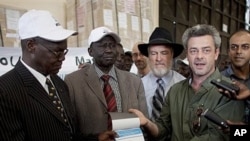As the referendum in south Sudan rapidly approaches, experts warn that pressure is needed from all sides to create a stable environment for the vote as well as the possible split of the war-torn country in early 2011.
With less than three weeks left until voters from across southern Sudan take to the polls to decide their region's future, Africa's largest country has become a ticking time-bomb watched nervously from all corners of the globe.
Many expect that blast to separate Sudan into two new countries, but there is concern how violent the separation will be.
2010 bore witness to the last gasps of the Comprehensive Peace Agreement - an internationally backed peace treaty between North and South, which was designed to make unity more attractive to the two sides still smoldering from a 21 year conflict.
Now all that remains of the agreement is the January 9th referendum. Despite the prospect of losing a majority of its critical oil revenues, northern officials - including Sudanese president Omar al-Bashir have agreed to respect the results. But all is not well with the vote.
The governments of North and South Sudan have yet to agree on crucial post-referendum agreements such as oil revenue sharing and the demarcation of the north-south border.
Throughout the process international actors such as the United States have pushed hard on both sides to reach an agreement.
At the U.N. General Assembly meeting in late September, U.S. President Barack Obama held a Sudan Summit in hopes of an agreement.
State Department Spokesman P.J. Crowley again pushed for a final agreement during a follow-up to the summit in Ethiopia. "There are clear responsibilities that both North and South have," he said. "And while we worked through some of the issues this weekend, we expect that both sides, particularly Khartoum, needs to come to the next meeting prepared to reach an agreement."
But an agreement was not reached.
These long-running disputes have now been compounded by a recent decision to delay the simultaneous referendum in oil-rich Abyei region. Abyei, which straddles the border, was set to decide whether it joins the north or south, but commission officials say logistical challenges have forced a delay of "a few days."
Many see these developments as a precursor to war, but Zach Vertin of the Brussels-based International Crisis Group has urged caution for all actors involved.
"The self determination vote will take place in January but that does not automatically equate to independence. It is more likely that there will be a period between January and the end of the Peace Agreement's interim period in July 2011 to work out remaining details," Vertin said.
But uncertainty surrounding the referendum has left the border dangerously militarized. Members of the Sudanese Armed Forces stand guard along the north-south border just miles away from contingents of the Sudan People's Liberation Army of the south.
Nobody believes a return to war would benefit either side, but the complexity of situation may take matters out of officials hands. According to Small Arms Survey, one of the flashpoints for violence may not actually be in the south, but just across the border. If the referendum produces a split, there are many southern communities that could be left behind in the North.
Small Arms Survey Sudan Project Manager Claire McEvoy told VOA that worry about further marginalization could spark further conflict, possibly drawing in the southern army.
One possible way of preventing conflict in those regions may be through "popular consultation, outlined in the CPA. Popular consultations would allow for renegotiation of the terms of the CPA in the South Kordofan and Blue Nile States. McEvoy says such engagement would allow groups to define their relationship with Khartoum. "If that were done in a meaningful way it could allow for devolution. It could go some way to satisfying the aspirations of people of those states," he said.
But Popular Consultation should have taken place long ago. Although international pressure has been unsuccessful in many respects, McEvoy says diplomatic engagement would be crucial for Popular Consultations as well as regional stability.
"Concerted diplomatic pressure is required as we move towards the referendum for the south, both before it and after it. It is highly likely that the result may be disputed," McEnvoy said. "I think the international community needs to be prepared for that eventuality and to have a plan - a credible plan."
With so little time until the beginning of the vote, observers, aid workers, and Sudanese alike are preparing themselves for the worst, and without both international and local engagement, the worst may come to pass.




